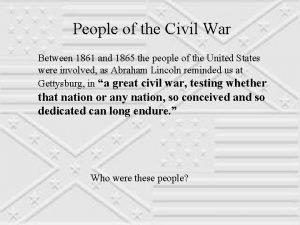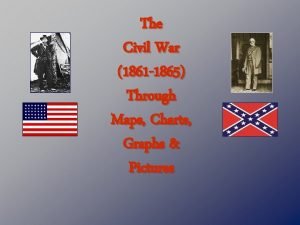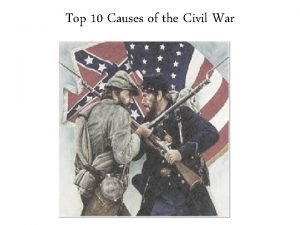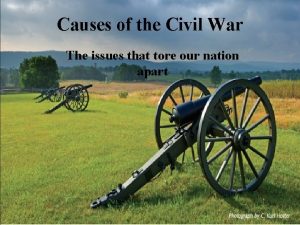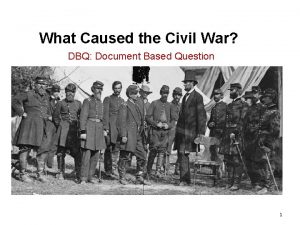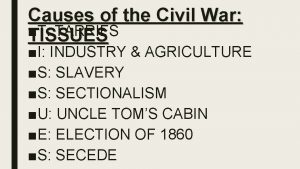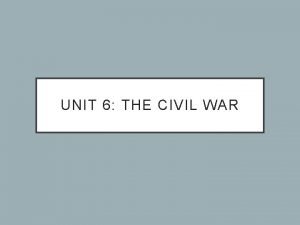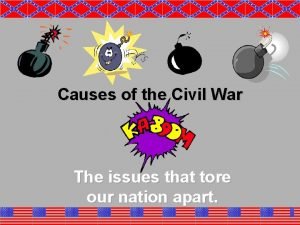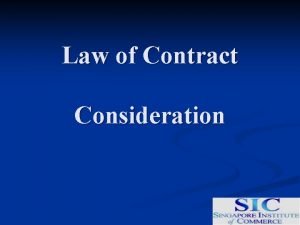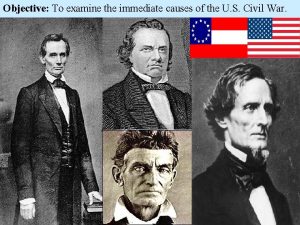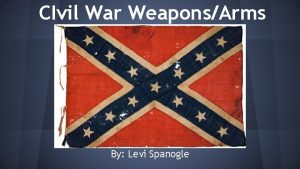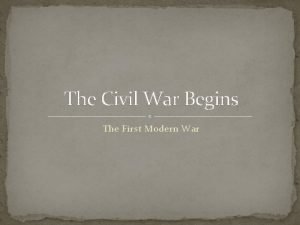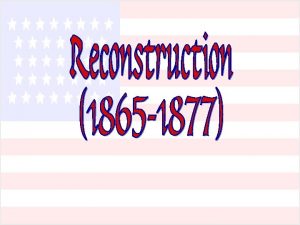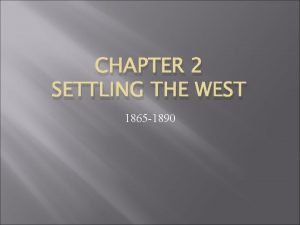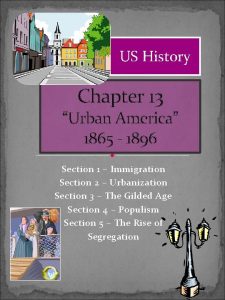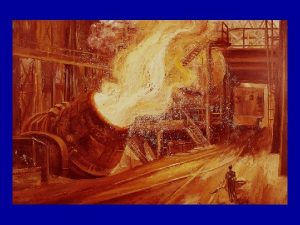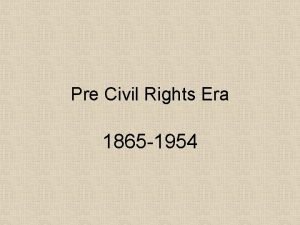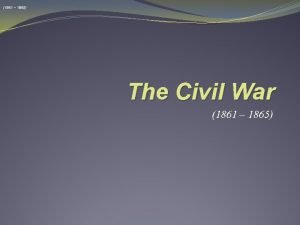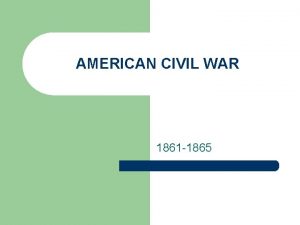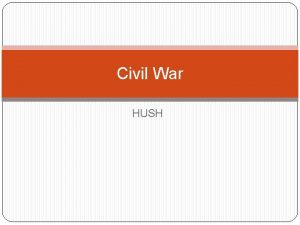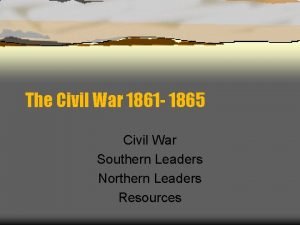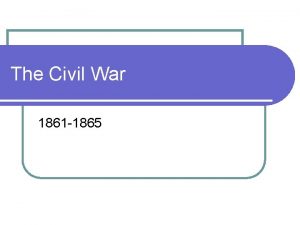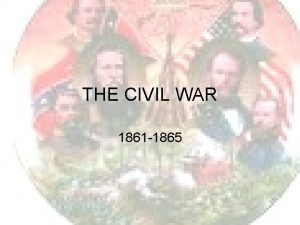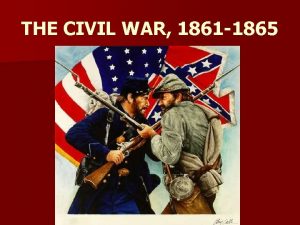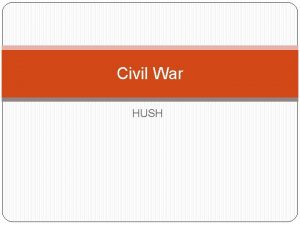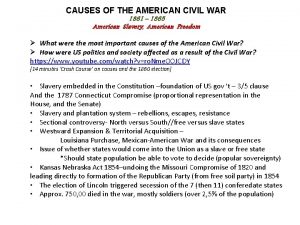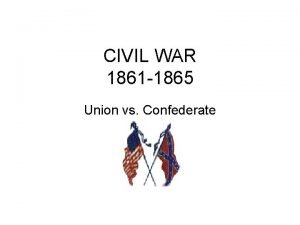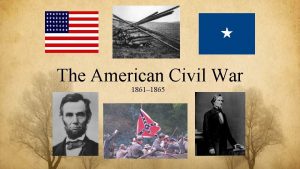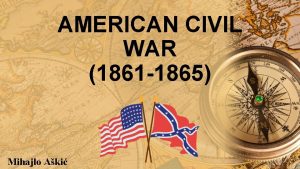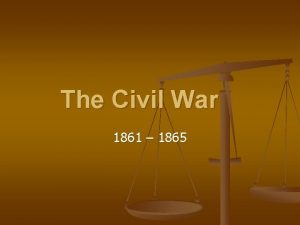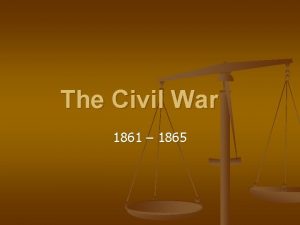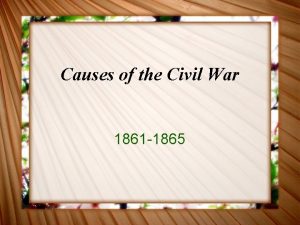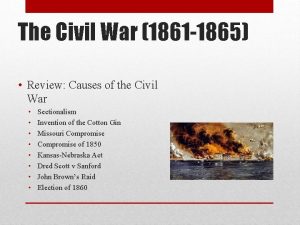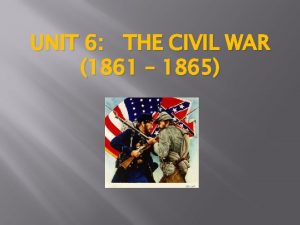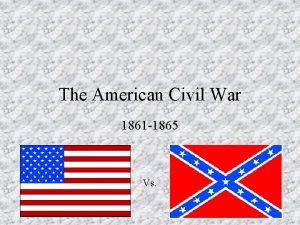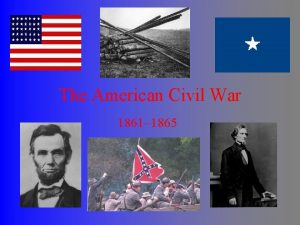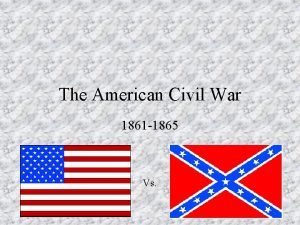Civil War 1861 1865 Causes of Civil War
































- Slides: 32

Civil War 1861 -1865

Causes of Civil War § Leaders of the North and South argued over states’ rights § States’ rights is the idea that states have the right to limit the power of the federal government § Southerners felt that the states could limit the power of the federal government § Northerners felt the states could not limit the power of the federal government

Causes of Civil War § The second major cause was slavery § People in the South wanted to keep slavery § Texas and other southern states depended on slavery for their economy § People in the North wanted to end slavery because they felt it was wrong § The third cause was arguments over the use of public lands that split the states

Slavery in Texas § Many settlers brought slaves with them to Texas § Growing the number one chief product in Texas, COTTON, required many farm workers § 30, 000 slaves in 1845 when Texas joined the U. S. § 182, 000 slaves in Texas by 1860 (6 X)

Slavery in Texas § The average price of a slave between 1850 & 1860 was $600 § Blacksmiths and other skilled craftsmen cost more than $2, 000 § Slaveholders fed, clothed and housed the slaves § This cost little compared to the profits earned from cotton

Treatment of Slaves § The law regarded slaves as property in Texas and the rest of the South § Slaveholders could buy, sell or rent out slaves – often used to pay debts § Some slaves were treated well since the owners depended on them for production § Some slaves were overworked and barely given enough food to survive § Slaves had almost NO control over much of their lives

Daily Lives of Texas Slaves § Worked in fields 5 -6 days a week from sunrise to sunset § Lived in small log cabins with dirt floors § Owners encouraged marriage…children meant more slaves § Family ties were strong but could be separated at any time § Slaves developed their own culture § Religion and music were a source of comfort and hope

Daily Lives of Texas Slaves

Slave Codes § Slave codes were designed to keep slaves from running away or rebelling § Slaves were forbidden to gather in groups of more than 3 § Slaves could not leave the farm without a written pass § Slaves were not allowed to own guns § Slaves were not allowed to learn to read and write

Slave Escapes § Many slaves tried to escape to the North or to Mexico § Journey was long and dangerous § Every county had slave patrols that arrested any unknown black person § Very few slaves made it to freedom § Slaves could be whipped or hanged if owners even heard “rumors” of an escape

Slave Escapes

Slave Rebellions § Many slaves tried to rebel § Some slaves attempted to strike back by breaking tools, destroying crops, stealing food or working very slowly § Some revolts turned violent § In some cases, whites were killed…but in most cases it was the slaves being killed § Slaves were whipped or hanged for rebelling § Owners could not be punished because slaves were not citizens/no court hearing

African Americans in Texas § Not all African Americans in Texas were slaves § 400 free black men and women in Texas according to 1860 census § Most had jobs as a blacksmith, wagon maker or worked at the sawmills § Abolitionists were hung or forced out of Texas if they spoke out § Abolitionist – person who wanted to end slavery

Missouri Compromise 1820 § There were 11 free states and 11 slave states in 1819 § Missouri was applying for statehood and wanted to be a slave state § U. S. decided to add a free state to keep the balance between slave and free states § Missouri would be admitted as a slave state § Maine would be admitted as a free state

Missouri Compromise 1820 § To settle the issue of slavery in western territories, an imaginary line would extend westward § All new states north of Missouri would be free states § All new states south of Missouri would be slave states

Missouri Compromise 1820

Compromise of 1850 § In 1849, there were 15 slave states and 15 free states § California applied for statehood § Oregon, Utah and New Mexico were close to applying for statehood § ALL wanted to be free states § This would upset the balance § Southern slave states feared they would lose votes in the Senate

Compromise of 1850 § Southern slaves states started talk about secession § Secede – to withdraw from the Union § Northerners believed slavery was evil but the break up of the U. S. would be worse § In the Compromise: § § § Settled the Texas/New Mexico western border California would enter Union as a free state Mexican Cession territories in West would decide issue of slavery by popular sovereignty § Fugitive Slave Act was created

Compromise of 1850

Fugitive Slave Act 1850 § All citizens are required to help catch runaway slaves § If you help slaves escape, you would be fined $1, 000/possible jail time

Kansas-Nebraska Act 1854 § The Compromise of 1850 dealt with lands of the Mexican Cession § It did not resolve the issue of slavery for the Louisiana Purchase § People of Kansas and Nebraska would decide for themselves the issue of slavery by popular sovereignty § Southerners supported the Act § They felt the Act supported states’ rights § Northerners opposed the Act § They felt the Act overturned the Missouri Compromise of 1820

Kansas-Nebraska Act

Kansas-Nebraska Act 1854 § Hundreds of proslavery men from Missouri came across the border and voted illegally to select a pro-slavery government § The new government quickly made slavery legal § Anti-slavery citizens refused to accept new government and elected their own § Kansas was in chaos with two rival governments § Armed gangs roamed the state looking for trouble § More than 200 people killed – Bleeding Kansas

Bleeding Kansas

Dred Scott Case 1857 § Dred Scott was a slave who tried to win his freedom through the courts § After his Missouri owner died, Dred Scott was sold to John Emerson and taken to Illinois, a free state, and Wisconsin territory § He married Harriet Robinson and John Emerson married Irene Sandford § They all returned to Missouri and John Emerson died § Dred Scott filed suit against Irene Sandford claiming he was free since he had lived in Illinois

Dred Scott § Scott v. Sandford case went to the Supreme Court § Supreme Court ruled that since Dred was a slave, considered property and not a citizen, his case would not be heard § The decision also said U. S. could not outlaw slavery in the Western territories § This decision supported the Kansas-Nebraska Act and overturned the Missouri Compromise

Dred Scott

“Texas Troubles” § By 1860, hostility between the North and the South was worse than ever § Violence erupted in Texas that summer § A series of fires damaged parts of Dallas, Denton and Pilot Point § Abolitionists and slaves were blamed for the fires but there was no evidence § Texas vigilantes punished those people they “thought” were guilty § Vigilantes – people who take the law into their own hands § Between 30 -100 people were hanged (slaves)

Texas Secedes § Abraham Lincoln, a Republican, was elected President in 1860 § He received NO votes in Texas § Southerners worried what the President and Congress might try to end slavery § On December 20, 1860, South Carolina became the first state to secede from the U. S. § Other states followed: § Mississippi ~ Florida ~ Alabama ~ Georgia ~ Louisiana § Petitions from around Texas called for Governor Sam Houston to get Texas to secede

Texas Secedes § Sam Houston opposed secession and wanted to keep the U. S. together § Texans held a convention without Houston in January 1861 to discuss secession § The delegates voted 166 to 8 to secede § Texas was the only state to have the people vote on whether or not to approve secession § Texas joined the Confederacy in February 1861 § State leaders took an oath of loyalty to the Confederacy § Sam Houston refused to sign the oath of loyalty § Confederates removed Houston as governor

Texas Secedes § More states seceded including Virginia ~ Arkansas ~ North Carolina ~ Tennessee § Eleven (11) states seceded from the Union § Southerners believed they had every right to secede § According the Declaration of Independence: “It is the right of the people to alter or to abolish” a government that denies the rights of its citizens § They believed Lincoln would deny them the right to own slaves § The stage was being set for war…

North vs. South
 Civil war 1861/1862
Civil war 1861/1862 Civil war 1861/1862
Civil war 1861/1862 Causes of the civil war jeopardy
Causes of the civil war jeopardy Causes of the civil war
Causes of the civil war What were the 4 main causes of the civil war
What were the 4 main causes of the civil war Cause of english civil war
Cause of english civil war Causes of the civil war dbq
Causes of the civil war dbq Tissues causes of civil war
Tissues causes of civil war What were some causes of the civil war
What were some causes of the civil war What are the 3 main causes of the civil war
What are the 3 main causes of the civil war England v davidson (1840)
England v davidson (1840) South carolina 1861
South carolina 1861 India council act 1861
India council act 1861 Springfield model 1861 rifle facts
Springfield model 1861 rifle facts Tensionometer
Tensionometer Unionistička stranka 1861
Unionistička stranka 1861 Why was the civil war considered the first modern war
Why was the civil war considered the first modern war Chapter 16 lesson 2 challenges to slavery
Chapter 16 lesson 2 challenges to slavery Chapter 3 industrialization (1865 to 1901 answers)
Chapter 3 industrialization (1865 to 1901 answers) Whats the compromise of 1877
Whats the compromise of 1877 Guided reading activity settling the west 1865-1890 answers
Guided reading activity settling the west 1865-1890 answers The rise of industrial america 1865-1900
The rise of industrial america 1865-1900 Becoming a world power 1865-1917
Becoming a world power 1865-1917 American literature 1865 to 1914
American literature 1865 to 1914 Al cruzar una planta de guisantes de flores purpura
Al cruzar una planta de guisantes de flores purpura The rise of industrial america 1865-1900
The rise of industrial america 1865-1900 Impressionism characteristics
Impressionism characteristics Urban america 1865 to 1896
Urban america 1865 to 1896 Impressionism (1865–1885)
Impressionism (1865–1885) Industrialization (1865 to 1901 worksheet answers key)
Industrialization (1865 to 1901 worksheet answers key) 15 th ammendment
15 th ammendment Chapter 20 becoming a world power notes
Chapter 20 becoming a world power notes Hollywood silver fox farm v emmett
Hollywood silver fox farm v emmett
